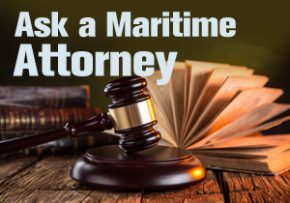Ask a Maritime Attorney: Should I Submit an Insurance Claim and Risk Voiding My Electrician’s Warranty?
Question:
Our boat was damaged recently by an electrical fire caused by faulty wiring. The wiring had been installed recently by a marine electrician who was recommended by a friend but who has been nothing but trouble since the day he arrived at our boat. He admitted that the fire was his fault, and he returned to the boat to repair the faulty wiring but has not been able to find the problem. We’ve had no more fires but our electrical problems continue. I wanted to call my insurance company to report a claim but the electrician warned that his warranty would be void if we allowed someone else to work on the wiring. The boat also sustained fire and smoke damage to carpeting, upholstery, and cabin surfaces which he is not qualified to repair, so it seems like my only choice is to call this insurance company and risk voiding his warranty. What are my legal options?
Answer
We often hear from readers who are reluctant to report a claim to their insurance company, and I always have the same advice to them. Report the claim as soon as possible! There is no downside. This is not the first time that I have harped about this issue in this column, but readers continue to share stories like this. A delay in reporting the claim may prejudice the insurance company’s ability to investigate the cause of the loss or it may affect their ability to repair the boat, which may itself lead to a denial of coverage. The claim may be denied for some other reason or the insurance company may be hard to work with, but the advice is always the same. Report the claim, and report it early. With that advice in mind let’s look at this case.
First, the loss is probably covered by insurance. Hull and machinery coverage under a yacht policy covers the negligence of the boat owner and the owner’s agents. The ‘negligence’ umbrella is huge, and it includes things like running the boat aground because you weren’t paying attention or a slip and fall injury aboard the boat. It also includes mistakes made by people you hire, such as the electrician in our reader’s case.
When a claim is submitted to an insurance company, they will often send a marine surveyor to the boat to investigate the cause of the loss, and to work with shipyards or other professionals to recommend a proper course of repair. They may consult with the vendor who caused the loss to help in their investigation, but they will not recommend that person for the actual repair job. Our reader’s electrician was correct in that regard – someone else will perform the repairs if the insurance company is involved. He is otherwise completely off base.
First, as noted above, the electrician’s suggestion that our reader refrain from contacting his insurance may jeopardize coverage of the claim if it causes undue delay. Second, the electrician’s warning about voiding his “warranty” is something that could ultimately support a claim of fraud, since he did not offer a warranty in this case. Perhaps his reluctance to involve our reader’s insurance company is actually based on his fear that the insurance company may sue him to recover the cost of the insurance claim!
In any case, whether purchasing goods or retaining service professionals, warranties are generally not a part of the transaction unless paperwork is provided to create an express written warranty. The purchase of goods may be accompanied by an implied warranty, but this is usually disclaimed through the use of as-is language that accompanies the purchase,
Service professionals are subject to different rules, and there is no law that would impose an implied warranty on a marine electrician. It would also be extremely rare for a marine electrician to offer an express written warranty, but they may do so in some cases to provide better service to their customers. A written warranty may include language that would void warranty coverage if an unauthorized service technician is used, but this restriction would need to be clearly spelled out and it would apply only in the case of an express written warranty. The bottom line is that there was no written warranty in place that would restrict the repair work on our reader’s boat.
Insurance adjusters are trained and experienced in the management of boat repair projects, which includes dealing with professionals like our reader’s electrician. Let them do their job by tendering your insurance claim to them without delay.
David Weil is licensed to practice law in the state of California and as such, some of the information provided in this column may not be applicable in a jurisdiction outside of California. Please note also that no two legal situations are alike, and it is impossible to provide accurate legal advice without knowing all the facts of a particular situation. Therefore, the information provided in this column should not be regarded as individual legal advice, and readers should not act upon this information without seeking the opinion of an attorney in their home state.
David Weil is the managing attorney at Weil & Associates (www.weilmaritime.com) in Seal Beach. He is certified as a Specialist in Admiralty and Maritime Law by the State Bar of California Board of Legal Specialization and a “Proctor in Admiralty” Member of the Maritime Law Association of the United States, an adjunct professor of Admiralty Law, and former legal counsel to the California Yacht Brokers Association. If you have a maritime law question for Weil, he can be contacted at 562-799-5508, through his website at www.weilmaritime.com, or via email at dweil@weilmaritime.com.


